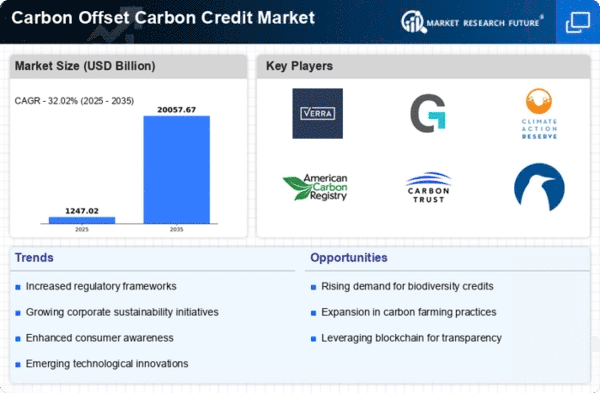Top Industry Leaders in the Carbon Offset Carbon Credit Market

*Disclaimer: List of key companies in no particular order
Top listed global companies in the Carbon Offset Carbon Credit industry are:
WGL Holdings, Inc.
Enking International
Green Mountain Energy
Native Energy
Cool Effect, Inc.
Clear Sky Climate Solutions
Sustainable Travel International
3 Degrees
Terrapass
Sterling Planet, Inc.
Bridging the Gap by Exploring the Competitive Landscape of the Carbon Offset Carbon Credit Top Players
The carbon offset and carbon credit market is experiencing explosive growth, fueled by rising global awareness of climate change and corporate sustainability initiatives. This dynamic landscape is populated by a diverse range of players, each vying for a slice of the pie. Understanding their strategies, market share determinants, and emerging trends is crucial for both established and aspiring participants.
Key Player Strategies:
Traditional Project Developers: Established giants like South Pole and Terrapass focus on large-scale projects like renewable energy and avoided deforestation, leveraging their extensive experience and trusted reputation. They are also actively building digital platforms and diversifying into new areas like nature-based solutions.
Technology-Driven Platforms: Innovative startups like AirCarbon and Nori are disrupting the market with blockchain-based tracking, streamlined purchasing processes, and direct connections between buyers and project developers. These platforms prioritize transparency and accessibility, targeting individual and smaller business customers.
Financial Institutions: Investment banks and asset managers are entering the fray, offering structured carbon-credit portfolios and financial products like carbon derivatives. This provides additional liquidity and stability to the market while attracting institutional investors.
Corporates with Internal Projects: Companies like Microsoft and Shell are generating carbon credits from their own internal emission reduction projects. They may trade these credits in the market or use them towards their own sustainability goals, adding another layer of complexity to the competitive landscape.
Factors for Market Share Analysis:
Project Portfolio Diversity and Quality: Offering a diversified portfolio of high-quality offsets across various project types like renewable energy, forestry, and energy efficiency attracts a broader range of buyers. Verifiable and impactful projects with strong additionality (demonstrating they wouldn't happen without carbon finance) hold greater value.
Technological Innovation and Transparency: Leveraging data analytics, blockchain for credit tracking, and user-friendly platforms enhances customer experience and builds trust. Openness and transparency throughout the carbon credit lifecycle are crucial for market integrity.
Geographic Reach and Regional Focus: Catering to specific regional needs and regulations can provide a competitive advantage. Companies focusing on emerging markets like India and China hold significant potential.
Cost-Effectiveness and Price Competitiveness: Optimizing project development and transaction costs, combined with attractive pricing models, can attract cost-conscious buyers, particularly in the voluntary market.
New and Emerging Trends:
Nature-Based Solutions: Nature-based offsets like afforestation, coastal restoration, and soil carbon sequestration are gaining traction for their potential to capture significant carbon while providing co-benefits like biodiversity protection.
Direct-to-Consumer Platforms: Platforms connecting individuals directly with small-scale projects like cookstove replacements or community renewable energy initiatives are fostering personal engagement in carbon reduction.
Carbon Removal Technologies: Technological advancements in direct air capture and biochar offer exciting possibilities for permanent carbon removal, although cost and scalability remain challenges.
Standardization and Regulation: Harmonization of carbon accounting standards and stricter regulations on credit quality are expected to improve market efficiency and prevent potential greenwashing.
Overall Competitive Scenario:
The carbon offset and carbon credit market is characterized by fierce competition but also holds immense collaboration potential. Players with diverse strengths and strategies are vying for market share, leading to constant innovation and evolution. While established players retain an edge in project development and brand recognition, technology-driven platforms and niche-focused companies are carving out lucrative spaces. The market's long-term success hinges on increased transparency, robust standards, and the development of high-quality projects across various types and regions. Understanding this dynamic landscape and its driving forces is essential for all stakeholders seeking to navigate and contribute to a sustainable future.
This analysis provides a brief overview of the competitive landscape in the carbon offset and carbon credit market. More in-depth research can be conducted on specific player strategies, emerging trends in individual project types, and the impact of regional regulations on market dynamics. The continued evolution of this crucial market promises exciting developments in the fight against climate change.
Latest Company Updates:
WGL Holdings, Inc.:
- Offers carbon offset programs for small businesses in partnership with the Chesapeake Bay Foundation, primarily focused on landfill gas capture and tree planting. (Source: WGL Energy website)
Enking International:
- Recent project: Partnered with the World Bank to develop a $170 million initiative for renewable energy and carbon offset projects in India. (Source: Enking International website, Nov 2023)
Green Mountain Energy:
- Recent news: Partnered with Salesforce to provide carbon offsetting solutions for their cloud services. (Source: Green Mountain Energy website, Dec 2023)
Cool Effect, Inc.:
- Recent news: Launched a new initiative focused on supporting Indigenous-led climate solutions. (Source: Cool Effect website, Jan 2024)
Clear Sky Climate Solutions:
- Recent news: Announced a partnership with a major airline to offset emissions from passenger flights. (Source: Clear Sky Climate Solutions website, Dec 2023)










